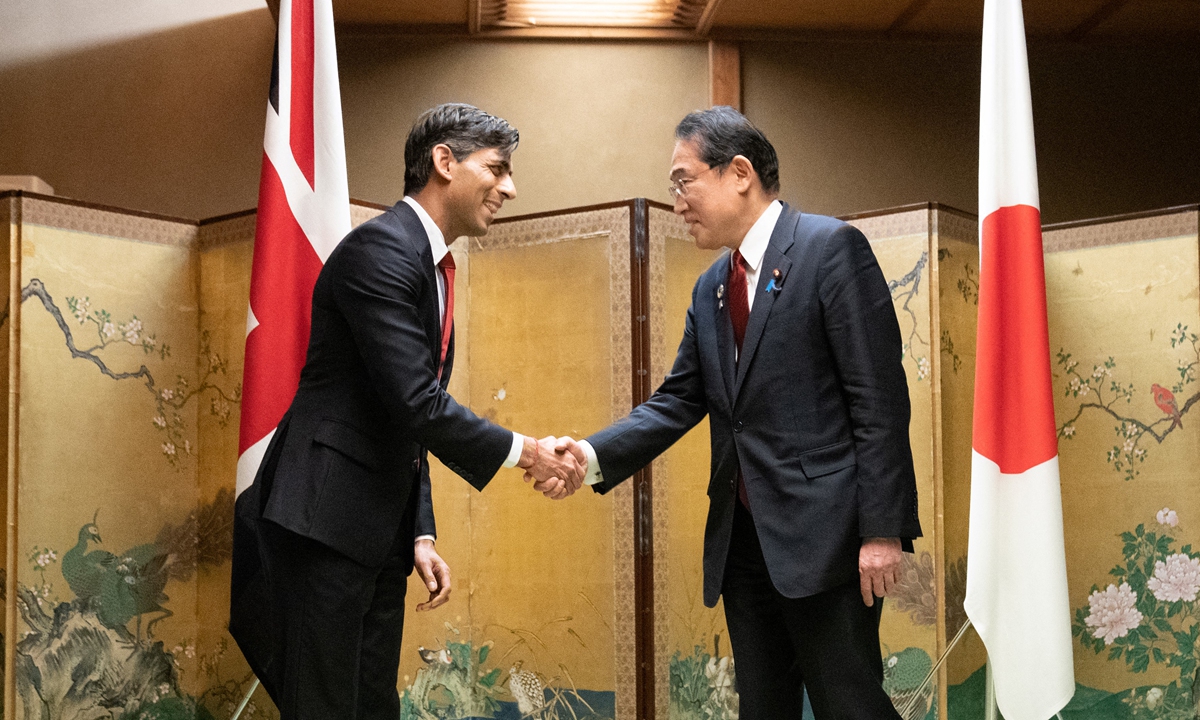
Britain's Prime Minister Rishi Sunak meets Japanese Prime Minister Fumio Kishida during their bilateral meeting in Hiroshima on May 18, 2023.Photo: AFP
The prime ministers of Japan and the UK on Thursday signed the "Hiroshima Accord" ahead of a G7 meeting, looking to deepen their ties in the fields of "defense, trade and investment, science and technology collaboration" among others.
From a military perspective, observers interpreted the accord as the UK's springboard to becoming more involved in the Asia-Pacific and a prologue to Japan's participation in AUKUS, bringing uncertainty and risks rather than any good to the region.
British Prime Minister Rishi Sunak will visit a naval base and confirm the new UK-Japan defense cooperation, according to a statement from the British government website, which described the accord as "historic."
The partnership includes doubling UK troop numbers in upcoming joint exercises, committing to deploying the Carrier Strike Group to the Indo-Pacific in 2025 and agreeing a formal Consult Clause, whereby the UK and Japan commit to consult each other on important regional and global security issues and consider measures in response.
Song Zhongping, a Chinese military expert and TV commentator, told the Global Times on Thursday that by signing the accord, Japan and the UK will increase technical exchanges, enhance military cooperation and joint drills, and more importantly, the use of each other's facilities.
The UK eyes regular deployment of its warship in the Asia-Pacific, which would require access to Japan's military bases.
The two countries in January signed a ground-breaking defense Reciprocal Access Agreement (RAA).The UK is unfolding its Indo-Pacific tilt in its military, diplomatic and political strategy with Japan as a transfer station. By inviting a European country and NATO member state, Japan can receive help in pressuring China, Song said.
Japan is seeking a certain form of participation in AUKUS, and enhancing defense ties with the UK serves as a springboard, Song said. Japan has signed an RAA with Australia, which is also a member of the AUKUS pact.
The intensity, frequency and scale of military communication and cooperation will also be discussed and settled step by step, further complicating the security scenario in the Asia-Pacific and bringing more risks and uncertainty, analysts said.
As part of the Hiroshima Accord, Japan and the UK will also announce the launch of a "semiconductors partnership," with new commitments to pursue ambitious R&D cooperation and skills exchange.
However, experts doubted how much substantial benefit the partnership will be able to yield. It is likely to be more a form of protectionism rather than cooperation based on market rules, Song said, warning they should not sacrifice their own national interests for the US' strategic goals.
The intensity, frequency and scale of military communication and cooperation will also be discussed and settled step by step, further complicating the security scenario in the Asia-Pacific and bringing more risks and uncertainty, analysts said.
As part of the Hiroshima Accord, Japan and the UK will also announce the launch of a "semiconductors partnership," with new commitments to pursue ambitious R&D cooperation and skills exchange.
However, experts doubted how much substantial benefit the partnership will be able to yield. It is likely to be more a form of protectionism rather than cooperation based on market rules, Song said, warning they should not sacrifice their own national interests for the US' strategic goals.




